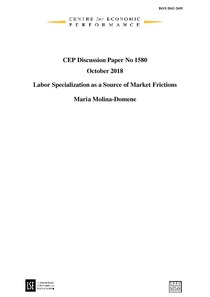Labor specialization as a source of market frictions
"This paper investigates why labor specialization brings additional frictions to the labor market. The intuition is that labor specialized firms rely on complementarity and firm-specific human capital, assigning high value to the worker-employer match. Consistent with employees' importance...
| Main Author: | |
|---|---|
| Institution: | ETUI-European Trade Union Institute |
| Format: | TEXT |
| Language: | English |
| Published: |
London
2018
LSE |
| Subjects: | |
| Online Access: | https://www.labourline.org/KENTIKA-19306187124911243699-Labor-specialization-as-a-sour.htm |
| Summary: | "This paper investigates why labor specialization brings additional frictions to the labor market. The intuition is that labor specialized firms rely on complementarity and firm-specific human capital, assigning high value to the worker-employer match. Consistent with employees' importance, the findings show that specialized firms preserve their workforce: these firms labor hoard and increase wages during slow-downs. Additionally, when specialized firms unexpectedly face a labor supply shock | albeit managing to decrease the wages of the remaining co-workers, they become less productive. Overall, the empirical evidence suggests that frictions introduce bilateral monopoly rents. " |
|---|---|
| Physical Description: | 36 p. Digital |

